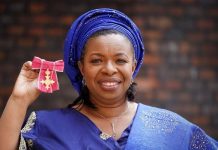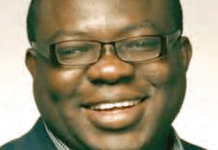
Paragonimiasis is a food-borne parasitic infection caused by the lung fluke – most commonly the Paragonimus westermani specie. It infects an estimated 22 million people yearly worldwide. The disease is more prominent in Asians, Africans and Hispanics because of their tropical habitats and cultures.
However, prior to 1972, little was known about the occurrence of the disease in Africa, and particularly in Nigeria, until Chukwuedu Nathaniel Nwokolo, a renowned physician, specialist in tropical medicine and medical researcher discovered and identified the parasite specie (Paragonimus uterobilateralis) in eastern Nigeria, just after the Nigerian civil war.
Chukwuedu Nwokolo is also credited with mapping out the endemic areas/ distribution of the lung disease in eastern Nigeria, as well as in mid-western Nigeria. He also carried out extensive study of the disease in Africa and led the establishment of clinical research programmes for its control. He founded SICREP: Sickle Cell Research Programme to effectively fight the disease in Nigeria and globally. Among Chukwuedu Nwokolo’s notable scholarly works is his book “Introduction to Clinical Medicine (Medicine in the Tropics)” and his contribution to the famous book, “Principles of Medicine in Africa – 3rd Edition” (Cambridge University Press).
Nwokolo was an advisor to the World Health Organisation on tropical diseases and to the Federal Government of Nigeria at the National Science and Technology Development Fund.
Background and education
Nwokolo was born on 19 April 1921, at Amaimo, Imo State Nigeria, to the family of Nathaniel Ezuma Nwokolo and Matilda Nwokolo. His parents worked for the Church Missionary Society as evangelists. He was the first male child amongst seven children. His father, Nathaniel, was a church teacher; and his mother, Matilda, was trained at the Niger Church Missionary Society (CMS) Onitsha.
Nwokolo had his primary education at Ezinihitte-Mbaise in Imo State, and his secondary education at Government College, Umuahia. In 1939, he entered Higher College, Yaba, to study Medicine. Incidentally, most of the students who went to Government College, Umuahia, went on to Yaba College, which was the only science-based institution of higher learning at the time.
Nwokolo’s medical course lasted seven years, which included internship programmes at the General Hospital, Lagos, and Aba General Hospital. Nwokolo qualified as a medical doctor in 1946, after graduating in flying colours. He won the Walter Johnson prize in public health and consequently got his LMS – Licenciate of the School of Medicine.
After his internship at the Lagos General Hospital, Nwokolo was posted to General Hospital Enugu, from 1947 to 1948, and then proceeded to work at the department of medicine at the University College Hospital as an assistant medical officer from 1949 to 1950. Thereafter, he proceeded to England for further studies.
After moving to London, Nwokolo studied at Queen Mary’s Hospital, Sidcup, and worked in medicine and surgery house jobs in Dover. He soon became qualified to register and practise in Great Britain. He then became a senior house physician in the geriatrics unit of Queen Mary’s Hospital, Sidcup. In 1953, Nwokolo obtained the Membership of the Royal College of Physicians qualification. He was one of the very few Africans to achieve such a feat, and the second Nigerian to do so – the first being Dr Olu Mabayoje.
In 1953, Nwokolo returned to Nigeria where he joined the civil service and appointed special grade medical officer and specialist in internal medicine. He served mainly at Enugu General Hospital.
While in the civil service, Nwokolo carried out medical research in the wards, as well as in the field. He did major research in endomyocardial fibrosis, endemic goitre, sickle-cell disease and other areas of national need. On the strength of his research and the papers he published, he was made a Fellow of the Royal College of Physicians (FRCP.) in 1960, based on recommendations by his supervisors, Professor Alexander Brown and Professor Harold Scaborough, a visiting scholar from University of Wales.
Nwokolo was also invited to teach as senior lecturer at University College, Ibadan, by Professor Brown. After demonstrating brilliance and dedication to research, Nwokolo was recommended by Professor Brown for a research fellowship in gastroenterology at the University of Minnesota, sponsored by the Rockefeller Foundation.
In 1964, Nwokolo returned from the United States after his Fellowship programme, and was appointed associate professor of medicine at the University of Ibadan. Subsequently, he set up a sub-department of gastroenterology, with senior registrar, Dr Lewis. Nwokolo led research on various gastro-intestinal problems, using intestinal biopsies and procedures he learnt at the University of Minnesota. However, in 1966, Nwokolo and his family left Ibadan for Enugu, just before the Nigerian civil war.
During the civil war, Nwokolo became the first head of the department of medicine and associate dean of medicine at the new medical school in Enugu. Nwokolo also carried out research, especially relevant to the terrible war conditions of starvation and malnutrition. After the war, Nwokolo was reappointed to his position as head of the department of medicine. He was appointed full professor in 1971 and later became Professor Emeritus in 1982 at the University of Nigeria, Nsukka.
Nwokolo received many awards and recognitions during his outstanding career in the civil service and academia. He was honoured in 1964 with the Edinburgh, Scotland “Free Man of the City” award and “Key to the City of Edinburgh”, having been inducted as a Fellow of the Royal College of Physicians of Edinburgh. He also received the Nigerian National Order of Merit Award (NNOM) and the Officer of the Order of the Federal Republic (OFR) Award for his immense contribution to public health in 1982 by President Shehu Shagari.
On 10 March, 1998 Nwokolo was recognised by University of Calabar Teaching Hospital (UCTH) for the Mary Slessor Distinguished Merit Award for service to humanity. This was in recognition of his research works, and the introduction of the Drug Revolving Fund at University of Calabar Teaching Hospital, a patient-funded system that was adopted by state governments in Nigeria; as well as for the system’s acceptance in core line with the Bamako Initiative. He was the longest serving chairman of University of Calabar Teaching Hospital’s board of management.
In 1996, Nwokolo was made Knight of Saint Christopher by the Anglican Church Diocese on the Niger. He was happily married to Lady Njideka Nwokolo, née Okonkwo – whom he married on Saturday, 4 July, 1953.
Nwokolo had seven children, four girls and three boys. He died in the United States on 18 May 2014 at the age of 93.










